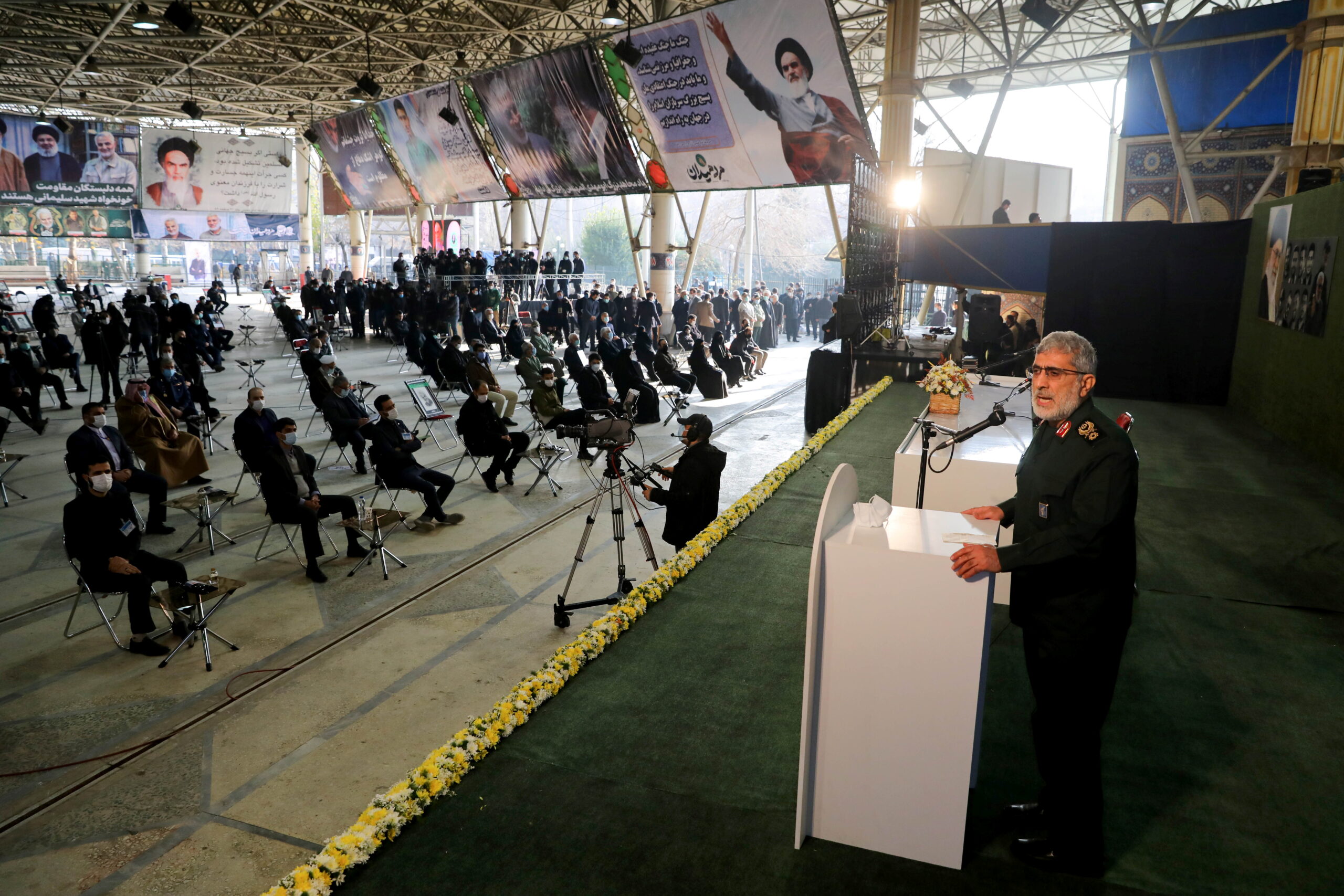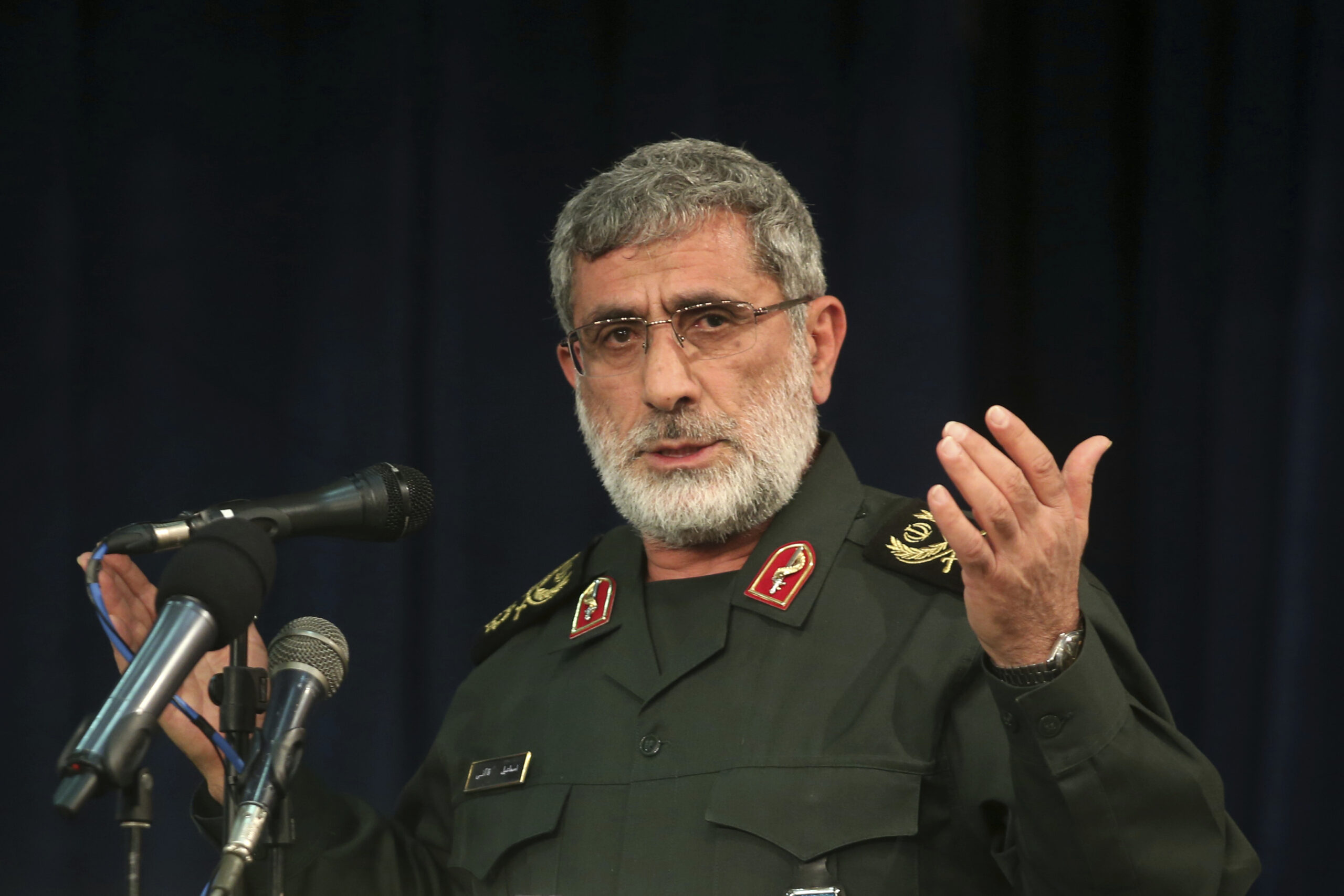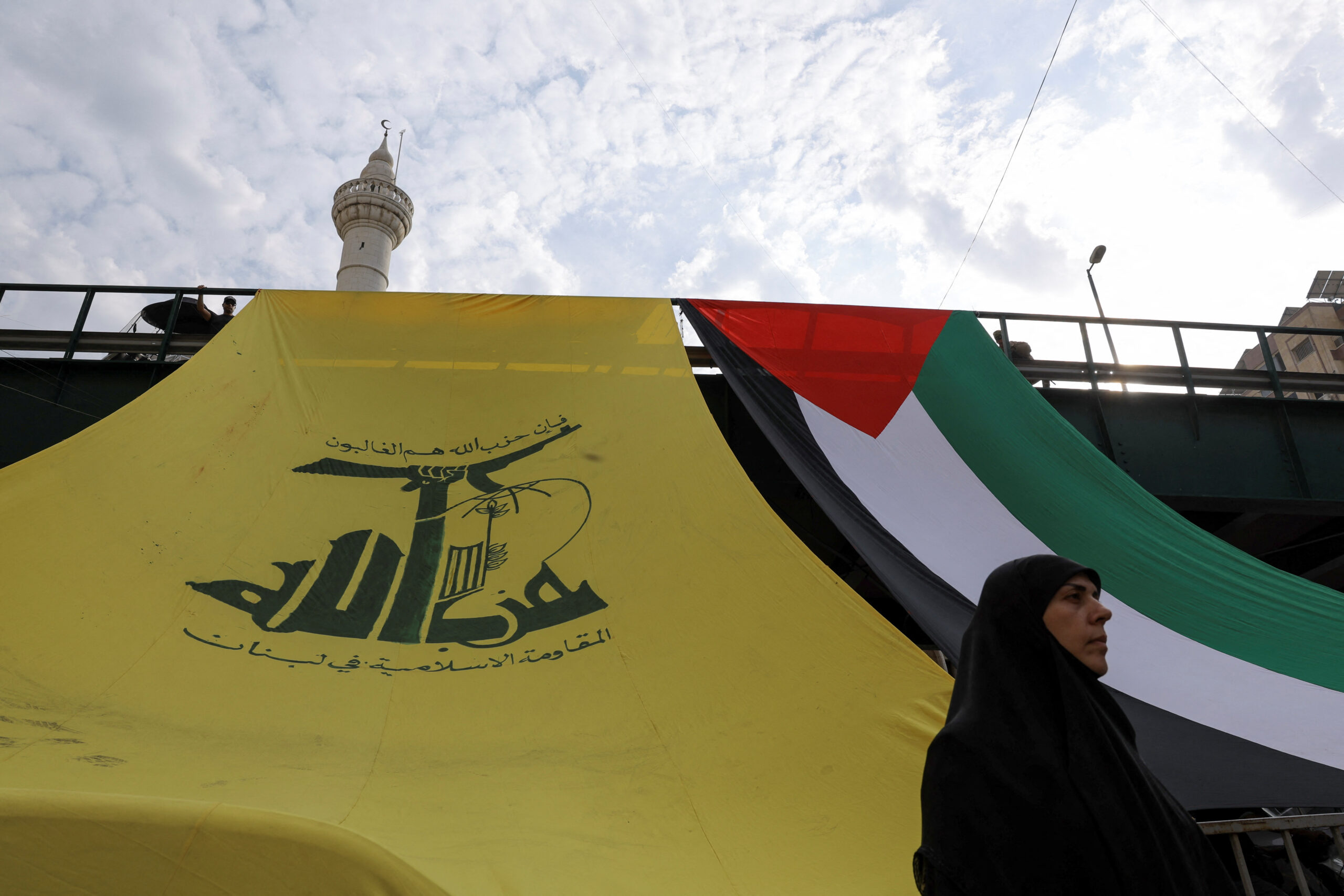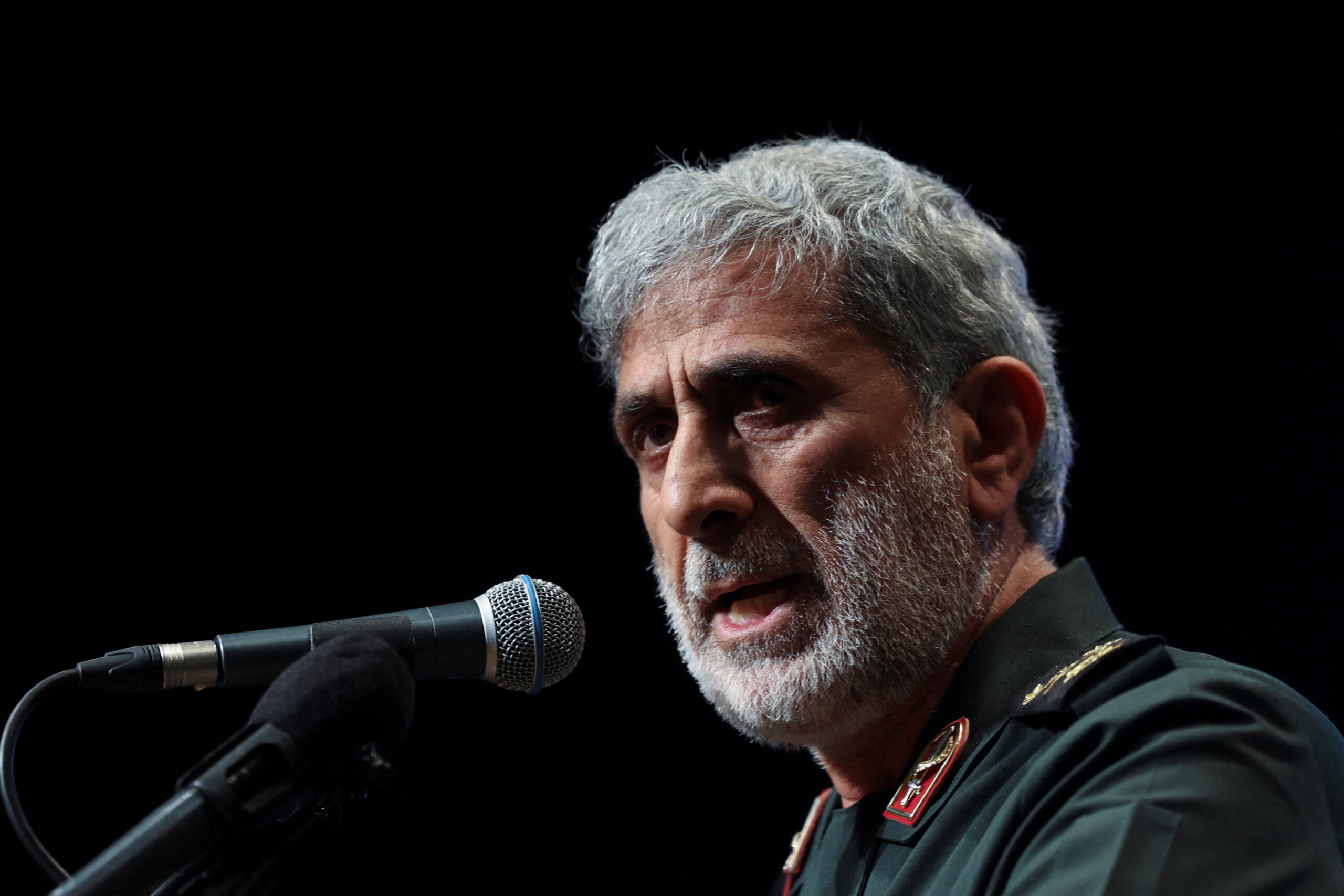Deciphering Quds Force Chief Qaani’s Words
Brigadier General Ismail Qaani’s public remarks offer some insights into the fundamental tenets of his thinking and ability to deal with delicate political problems, however they do not reveal Suleimani-style coded messages to the United States and Israel.

Brigadier General Ismail Qaani used to be a man of few words, but that changed January 3, 2020, when he replaced Major General Qassim Suleimani as chief of the extraterritorial operations Quds Force of the Islamic Revolutionary Guard Corps. Like his predecessor, Qaani has since mobilized the Persian language against Iran’s enemies, but to what extent is he also communicating coded messages to the Iranian public and perhaps even to adversaries, such as Israel and the United States? After all, Suleimani famously texted General David Petraeus, then commander of U.S. Central Command, and used at least one of his public speeches to send a coded message to then-President Donald J. Trump. On both occasions, Suleimani appeared to encourage U.S. officials to bypass Iran’s Foreign Ministry and establish a hotline between the Quds Force and CENTCOM, or even the White House. What message, if any, is Qaani communicating in his public remarks?
A survey of online Persian and English sources, including Google search, BBC Monitoring Middle East, and the Noor Mags database, produced 52 distinct instances of public communications by Qaani from January 3, 2020 to November 20, 2023. These comprised 34 public speeches, 16 open letters and written public statements, and two publicized phone conversations.
Qaani delivered his first major speech in his capacity as Quds Force chief July 14, 2020, around six months after Suleimani’s assassination, at a time when the Iranian public, or at least supporters of the regime, was expecting revenge. Addressing “commanders of the resistance,” a possible reference to the leaders of Iran’s regional proxies and allies, Qaani claimed a fire aboard USS Bonhomme Richard off the coast of San Diego was “divine” punishment for the United States’ wrongdoing: a comical attempt at taking credit for an accident onboard a U.S. warship.
Nevertheless, in line with Iran’s declared strategic objectives, Qaani has routinely demanded the withdrawal of the U.S. military from the Middle East. He is also keen on damaging the prestige of the United States, which he believes can be achieved by imposing small losses on it to make the superpower appear weak in the eyes of its allies. At times, he has vowed revenge against “those who unjustly shed the blood of martyr Suleimani,” and he consistently claims the United States and Israel “only understand the language of force.” But in his meetings with Quds Force proxy militias in Iraq in 2020 and 2021, he reportedly instructed them to bide their time and not give the United States and Israel any justification to start a war. With the exception of the discrepancy between Qaani’s words and deeds, none of his public addresses appear to have conveyed coded messages to the United States, but it is also possible that the key to deciphering the messages isn’t public.
Apart from bravado, Qaani also delivers tactical speeches. On September 29, 2020, Qaani heaped lavish praise on Iraqi Grand Ayatollah Ali Sistani, who commands a large following among Shias in Iraq and the world. Sistani opposes the Islamic Republic as a form of government on theological grounds and had recently faced criticism in Iran’s hard-line Kayhan newspaper at the time of Qaani’s speech. By praising Sistani, Qaani was likely hoping to control the damage caused by Kayhan’s provocative editorial, which risked creating serious challenges for the Quds Force in Iraq.
Another tactical speech of Qaani’s dealt with the Taliban, with which Iran has had tumultuous relations over the years. Addressing the Iranian Parliament on September 7, 2021, Qaani urged Iranian parliamentarians to extend a hand of friendship to the Taliban, Iran’s longtime adversary. Following the August 2021 U.S. withdrawal from Afghanistan and the Taliban’s seizure of power, Qaani wanted the parliamentarians to understand Iran’s need for peaceful coexistence with Afghanistan’s new rulers without appearing to abandon Iran’s traditional allies in the country, such as the Shia Hazaras and the Persian-speaking Tajiks. It was the United States that had “plotted” to create “divisions between Shia Iran and the Sunni world,” Qaani argued, and the best way of neutralizing the “plot” was to extend a hand of friendship to the Taliban.
On domestic political subjects, Qaani’s public statements have been more controversial and less elegant than his predecessor’s. Unlike Suleimani, who took great care in appealing to all political factions, in a May 2022 speech, Qaani criticized Iranian reformists and, in particular, supporters of former President Mohammad Khatami. “These people did not have a resistance mindset or had broken ties with the revolution,” Qaani said. In a much more controversial statement on December 21, 2022 following countrywide protests over the mandatory hijab, he said: “You never see an honorable north Tehran woman who is not wearing the hijab.” The statement was totally contrary to Suleimani’s famous quote, “Even the girl who is not sporting proper hijab is my daughter.” While Suleimani broadly mobilized Iranians for nationalist causes, Qaani’s statements were divisive. Realizing his mistake, Qaani corrected course on January 5, 2023, saying, “Even those without a proper hijab can be devoted Shia.”
Nine out of Qaani’s 16 open letters and written public statements are letters of condolence following the passing of various figures, including Mohsen Fakhrizadeh, a nuclear scientist; Ramadan Shalah, secretary general of Palestinian Islamic Jihad; Ahmed Jibril, founder of the Popular Front for the Liberation of Palestine-General Command; and Iraqi religious leader Grand Ayatollah Muhammad Saeed al-Hakim. Qaani’s statements regarding Fakhrizadeh, whose assassination was attributed to Israel, are particularly interesting. While vowing revenge in the open letter, during his December 1, 2020 visit to Lebanon, Qaani reportedly instructed Lebanese Hezbollah’s leaders not to avenge Fakhrizadeh and urged them to avoid provoking Israel.
The remaining open letters include obligatory congratulations to other branches of the Iranian military and a September 2022 letter of congratulations to President Ebrahim Raisi following his display of Suleimani’s portrait while addressing the United Nations General Assembly. Of greater political importance is Qaani’s May 20, 2021 open letter addressed to Mohammed Deif, also known as Abu Khaled, the supreme military commander of Hamas’ military wing. During the civil war in Syria, the Quds Force and Hamas were on opposing sides, with Hamas supporting Syria’s Muslim Brotherhood, and Qaani’s laudatory wording was a public symbol of the two organizations mending relations. Deif was also the addressee of Qaani’s November 16 open letter. In his first public reaction to the October 7 Hamas attack against Israel, the Quds Force chief wrote: “You clearly demonstrated the weaknesses and vulnerabilities of the usurping Zionist regime, which is more fragile than a spider’s web … The attacks of the resistance against the forces and armored vehicles of the enemy have proved to all that the resistance in Gaza is capable of initiative and innovation.” In more vague and noncommittal terms concerning Iran’s actions, Qaani concluded: “As a member of the effective supporters and guardians of the resistance, we assure you that we shall do anything that we must in this historical battle.”
The Quds Force has chosen to publicize only two of Qaani’s phone conversations: a May 15, 2021 conversation with Ismail Haniyeh, the chairman of Hamas’ political bureau, and a conversation the next day with Ziyad al-Nakhalah, the secretary general of Palestinian Islamic Jihad. The conversations, which took place against the background of Hamas and Islamic Jihad rocket attacks against Israel and retaliatory Israeli airstrikes in the Gaza Strip, communicated the Quds Force’s praise of “the Palestinian nation” and Iran’s “support for the rights of the Palestinian nation in the face of the crimes of the Zionists.”
While a survey of Qaani’s public speeches, open letters and public statements, and publicized phone conversations offers some insights into the fundamental tenets of his thinking and communication skills for dealing with delicate political problems, it does not reveal Suleimani-style coded messages to the United States and Israel. Perhaps there are none, or perhaps the key to deciphering Qaani’s words is yet to be discovered.
The views represented herein are the author's or speaker's own and do not necessarily reflect the views of AGSI, its staff, or its board of directors.




















